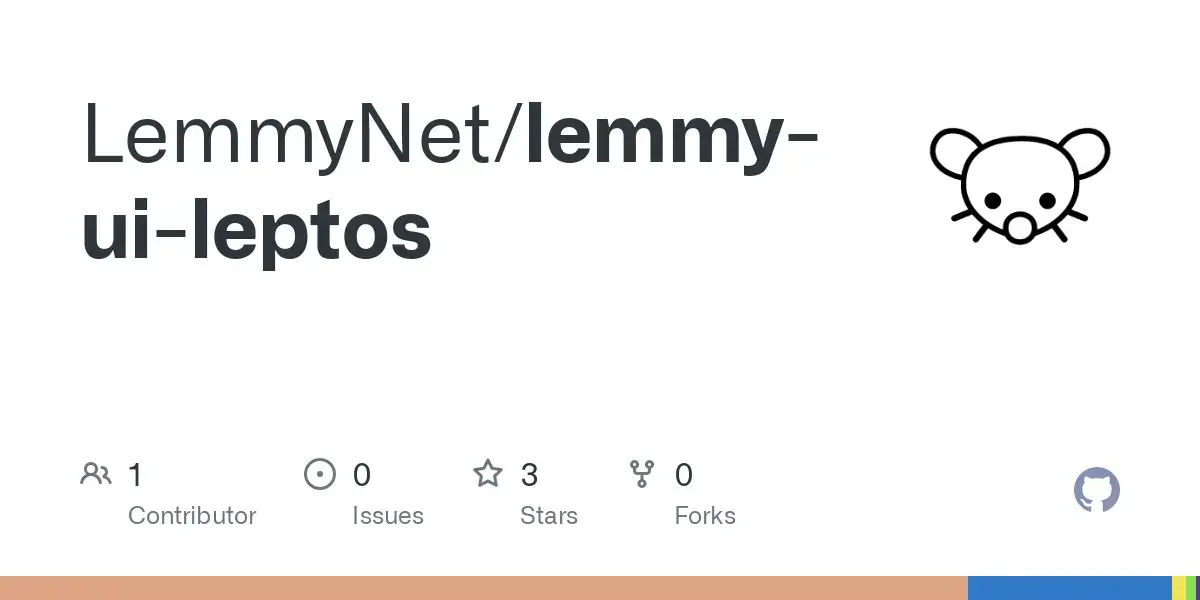Quoting the author
I’ve starting working on a lemmy front end called lemmy-ui-leptos using leptos, a Rust UI framework with isomorphic support, and tailwind + daisyUI for the component styling. This could eventually replace the frankenstein’s monster that lemmy-ui has become.

The Lemmy developers can do good things and increase net wellbeing while being complete morons. There is nothing in Lemmy’s license that says that by using their software you need to support their ideologies.
The Christian teaching of “hate the sin, love the sinner” is the best approach here. Showing support for what the lemmy devs are doing while showing how despicable are their beliefs and stating where are your differences will always work better than trying to boycott their (non-stupid-belief-related) work.

The problem is giving their project support also gives them a bigger platform and more influence which could lead to more people being exposed to their beliefs or them having a bigger impact

No, one does not follow from the other, especially for open source projects. Quite the opposite: for the project to grow, it will need to attract more people. To attract more people, they will need to dial down their extremist positions. If they don’t they will end up having their project forked.
Also,
being exposed to their beliefs
Great. Let more people be exposed to their beliefs so that they can learn how stupid they are.

Why are you posting on lemmy if you don’t think we should support lemmy?

Eh I called them out on it, but I’d rather they be used to continue developing the code base, which can be forked if necessary. People should be smart enough to evaluate their beliefs, and if not well… something would have gotten them eventually.

It’s not like they are programming communism into Lemmy.

The fediverse in general is the literal manifest of the means of production owned by the producers. Every denizen can see just about every post.
You would be hard pressed to not find the socialist ethos at play anywhere on the fediverse, not just Lemmy. And really that’s part of what gets hashed out here by broader adoption is just how ground level that gets.
The weird part is that whatever they think of dictators, they would know the model, and that gives me a bizarre amount of trust.

The weird part is that whatever they think of dictators, they would know the model, and that gives me a bizarre amount of trust.
Can you explain this more?

Sure! And I’m sorry in advance for the book, I’m literally around here studying this thing for this reason.
So it might help to understand Soviet as a pre Bolshevik term more resembling ‘council’ than a unitary block like a nation.
In the fediverse this is instances, they stand up, enroll users and give them voices. And if you graph a lot of the ethos it’s 1:1 from the ground up. For instance, you might say your posts here, once contributed are owned by everyone. You might also notice those with knowledge about the platform are maybe operating as a vanguard, you pick top or bottom (users and posts, or instances and software).
Historically part of the problem with distributed systems of independent operating electors is how they’re vulnerable either to local tribalism, warlordism, and a need for some degree of functional central control of core ethos.
The pile of ‘free market’ people mad at the phone company evolved into the modern Internet without a model, just chaos and genius. If the next wave is reactionary communists, we’re looking at something very different, but I’m not convinced it won’t mutate.
if this is communism the platform: I’m genuinely curious what crowd sourced central planning offers. The people who have studied that system, and it’s problems, are the ones in who have started the project. And they started with ‘to each for each’ as it’s core principle, but it’s easy to fork any foss project.
Part of what you learn when you start to read lefty philosophy is that they are (by volume and diversity), their own biggest critics. So there is going to be a plethora of times where we figure out of this is going to go pear shaped, and a ton of good or bad lessons that could come out of the canon.

In your analogy, where does Fast.ly fit in by being the only entity capable of handling mastodon.social traffic?
In your analogy, what do you make of mastodon.world and lemmy.world, which is a private company offering the service for “free”?
In your analogy, what do you make of the numerous cases of instances shutting down because the admin could not keep with the growth, or got run over by freeloaders who pissed on the well?
If “the fediverse in general is the literal manifest of the means of production owned by the producers”, does this mean that its “economic output” will always be inferior to other economic systems that are driven by profit motive? IOW, does this mean that the Fediverse is always going to be a small thing who will never be able to replace Big Tech?

So in reverse order:
The fediverse to me will always be an expanding niche, I don’t think the network effect social growth works without cash. If your looking to measure by quality of dialogue instead of growth I think this presents the best option. There’s plenty of economic benefit beyond ad sales from good discourse.
Instead you’re looking a million AOL install disk moments until ubiquity, if it doesn’t fall apart first.
Instances shutting down is actually markedly like the way famine, war or anything else beyond my control as your average user would have pushed us to other reps. You can pick up and move, but how much of your stuff? Open question. Long term it should be feasible for your own instance to fire up, fetch messages and close again, so in theory you could keep all of it.
Now hardest: scale and cost, which I’d really contend are the same problem. If you look at how such systems are introduced you find advocates for vanguard, reps, workers tribunals and nothing quite ever sticks without some lingering problems. And the reality is the web of our modern universe isn’t going to independently operate with anything.
I don’t think anything but a charitable model gets it off the ground, the same way I don’t think the Internet is a thing without the crazy good folks running BBS boards. But it should be institutional as broadly as possible if you want long term success and trust in platform.
I think perhaps you may be confusing nobody to assert ownership of the bits, with the supposition that there is no cost on delivery.

the supposition that there is no cost on delivery.
The absolute opposite, actually. There is a cost to content distribution and for the maintenance of the service beyond the servers. Moderation, system administration, bug fixing, security research, optimizations in storage…
Putting up a server is the easy part. Ensuring that it can serve its users well, not so much. To do it properly, it becomes a part-time job. Now that there is an element of novelty to it, we will see many people sticking around to this work, but as the novelty wears off, they will either treat it like work or stop doing it altogether. We can see that happening already with Mastodon.

There’s a difference between a tankie and a communist, and they are tankies.

Then they’ll certainly have a lot more centralized control in mind than I would. But I’ve been too too many punk concerts and heard poser, and seen too many misplaced lobs of entryism to dismiss anyone behind a pejorative. Especially while the free speech instances are running the same software right along with beehaw.
And more importantly some people can be smart at one thing and dumb elsewhere, just look at Ben Carson.

I mean they kind are, they run one of the biggest instances which of course will get a lot of attention because it’s run by the developers.
On that instance they censor criticism of china and other such topics.
There was also the weird case of the hardcoded slur filter

It’s still not great. Programming is a form of communication, and the platforms you design will reflect the kinds of messages you want to nurture and propogate. I made terms with it, electing to use lemmy in the fediverse on an instance they don’t manage (theirs are lemmy.ml and lammygrad.ml), because kbin wasn’t quite prime time ready yet. But if I were going to keep using Lemmy once kbin is more mature, lemmy would need to be developed with a decentralized governance committee or there would need to be a hard fork

Imagine if we did this for large companies owned by billionaires. Why is nobody talking about a board of director (Thiel) from Meta literally being one of the top donors for the republicans, supporting many of those congressional candidates that claimed there was voter fraud going on in 2020.
Perhaps we should flock back to Reddit instead, partly owned by a Chinese company. Who also support Russia and deny human rights violations.
Or why not head over to Twitter owned by the worlds richest man using it as is very own playground, supporting Trump and DeSantis, censoring Turkish dissidents and journalists writing about him in negative light.

I will take “What is a good example of Whataboutism?” for $400, Alex.

So… That’s an overly simplistic view of the situation. Remember, there’s also the fallacy fallacy, which states that just because someone commits a fallacy doesn’t mean they are wrong. Whataboutism isn’t just a fallacy, you can use it to see your own inconsistencies and hypocrisies.
What he’s saying is that Reddit isn’t any better, Billionaries are terrible and own everything, and all platforms censor. Open source/decentralization is the best alternative, no matter who the devs are. Is Lemmy so much worse than other platforms? Or even… bad at all?
Statement: Lemmy is bad because the developers are ML and support CCP Response: Reddit is bad because its partly owned by a Chinese company ->Whataboutism!!!<- Or… simply understand that just because X developers have an opinion you don’t agree with, or a platform is owned by someone you don’t agree with, you can still engage on that platform for various reasons…

We all think Meta is shit.
People complain about tencent all the time.
We also all think twitter is shit.

What’s your point? I understand that you don’t sympathize with the devs political position but so what? Either you see some point in lemmy despite this like most people on here who don’t agree with them, or you don’t and then you should just log off.
I’m not particularly interested in seeing this argument being hashed out anytime lemmy development is mentioned so please stop making this comment on unrelated threads.

Oh no we better stop paying for their software…
Oh wait

This user is already getting ratiod, but for anyone who thinks this is a reasonable comment…
So… Twitter is now owned by a dictator that now claims that ‘cis gender’ is a slur. Seems like he is barreling towards fascism to me. Facebook is owned by, maybe not a fascist, but someone that allows fascist content on their platform in order to increase revenue. They even admit that it is good for business. The AI researchers at Facebook trying to reduce fascist content were fired because they were actually effective, but would loose the company money. They also own threads, the twitter alternative. The Reddit CEO has used authoritarian methods to undo protesting on the platform. Sounds pretty authoritarian to me.
Even so, the united states performs human rights violations all the time, inside the US, and outside using the military. You don’t see CEOs and politicians denouncing the USA after committing human rights violations, do you? Do you know all of the Chinese politician opinions on the matter?
If you want to avoid all forms of authoritarianism, you could live under a rock. The fact of the matter is that open source and decentralization is the absolute best way to avoid authoritarianism, no matter who writes the code. Fork it if you don’t like it.

I’d say most if not all the up votes it’s getting are from their own accounts. Imagine having nothing better to do than this.

Whenever I click on the link it prompts me to register on kbin. Is it a closed off instance?

It’s not closed off no, try this link instead, it’s the same link but in a different format:
https://kbin.social/m/lemmyworld@lemmy.world/t/47012/Update-from-Lemmy-after-the-Reddit-blackout-From-the-Lemmy#entry-comment-196579

Ive removed this comment due to being unrelated to the actual topic of the post which is the new lemmy frontend. Reminder to keep talks here about rust rather than politics. Theres a ton of other communities for that and the lemmy dev politics have already been discussed heavily

It’s always relevant when the dev of what is being discussed denies human rights violations by authoritarian governments, why is that something you want to hide?

The core dev of said software put it in a position where it can be forked at any time. If they decide to go crazy in the future and affect how we use the platform were just going to make a fork here and then continue on that. Until then there’s just a separation of the developer and the software
(Especially since this is a community for discussing the software due to being c/rust/)
Theres also way more contributors than just dessalines and nutomic for things relating to lemmy now after the wave of people from reddit

Very good news!

Isomorphic support? Isomorphic to what?

Itself, via the identity function

Sounds good, but I hope it doesn’t take too much time that they ignore some of Lemmy’s issues and missing features.
- argv_minus_one ( @argv_minus_one@beehaw.org ) English4•11 months ago
Isomorphic rendering seems horribly inelegant.
My first instinct is to just use server-side rendering for this, although that may not be possible since posting a comment involves rendering part of the page on the client side.
In light of that, my second instinct is to render entirely on the client side, but then Lemmy won’t work without JS, which may or may not be a problem. Mastodon seems to get away with it, but I dunno if Lemmy can. Also, client-side rendering makes it difficult to avoid breaking the back button, which the UI currently does.
Sheesh. Web development is such a mess.

Why is it a problem to not work without js?

This is cool. I’m a front-end focused dev by trade and have been 11 years now. I’ve been picking up Rust as a side hobbie for 6 months or so and have not even peaked at these front-end frameworks. I know Lemmy is all about Rust, but I still think it’s pretty cheeky they’re using Rust for the front-end.
About Leptos specifically… If there’s no shadow dom / rerenders and not trying to be react, I already like it better than it’s competitor.

Ugh… Strong NIH vibes. There’s already the Liftoff! client for mobile, desktop and web. They should contribute to that instead and ditch jerboa and the web client. Anyway, a web browser is a terrible way to interact with the fediverse since the browser doesn’t know about your accounts, so I’d advocate for getting rid of web apps altogether

Anyway, a web browser is a terrible way to interact with the fediverse since the browser doesn’t know about your accounts, so I’d advocate for getting rid of web apps altogether
I’m confused about this - so you’re saying that people on their desktop/laptop shouldn’t be able to browse Lemmy from their web browser? Having to install an app really only works for the likes of say, Snapchat and Instagram where they’re mobile-first platforms which clearly Lemmy is not. Even Discord, who really wants you to use their desktop app allows you to use it via a browser and most of the features are still available (and the ones that aren’t are due to browser sandbox limitations, such as PTT and “Krisp” support).
I’m even more confused about “since the browser doesn’t know about your accounts”, are you saying that its bad that you have to sign into your instance’s account when you first start using the site? Because I don’t see how that is different from mobile (or even a desktop app) either, I use Liftoff on my phone and its not like it magically signed me into my account even though I had other Lemmy apps already signed in on my phone. I feel like I must be really misinterpreting what you’re saying here.
I know that Android does technically have an Accounts Framework that multiple apps can tie into (so that if you have multiple apps from Microsoft for example, signing into one app signs into the others) but I’m pretty sure that only works if all the apps are signed by the same digital key - which makes sense for your general corporation like Microsoft, Google, Apple, etc but not for apps made my multiple independent developers since that would be a massive security issue.
And even if that none of that were an issue, Liftoff is made with Dart/Flutter, which dessalines (the main dev of lemmy-ui and Jerboa) may not have any experience with which could be another potential issue. I’ve contributed a couple of small fixes for Jerboa, but while I have Kotlin + Android experience, I don’t have that much experience with Jetpack Compose (the UI framework Jerboa uses) which means in order for me to make any major contributions to Jerboa I’d need to get caught up on the whole Compose stack first (which when I originally did try to learn it, was an incredibly rapidly moving target like Swift/SwiftUI was in its early days) and I wouldn’t be surprised if Flutter was somewhat similar to this.

The issue is really with links specifically , and the concept of web addresses for federated content in general. The web model does not map very well onto federated networks. Concrete example: If I search for something on google and then get a lemmy/kbin result, my browser doesn’t know that I want to view this content through my home instance. The question “I have a Mastodon/Lemmy account, so why can’t I fave/reply/whatever this content?” comes up a lot. The issue here is that people view the content through a web browser, and web browsers don’t understand the fediverse.

The best solution there would probably be some brower plugin/extension/whatever that replaces fedivers URLs with the “redirecting” URL of your instance of choice.
Given that it’s a simple text replacement, the most complicated part is probably recognizing fediverse sites (a list of sites with a fallback button would also work).

Unifiying the tech stack was a good idea + Fixing the internals


